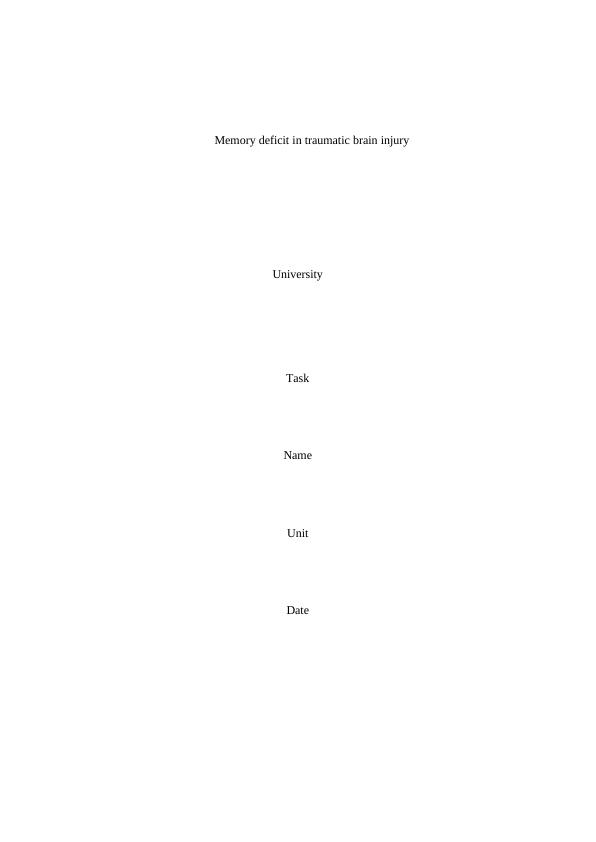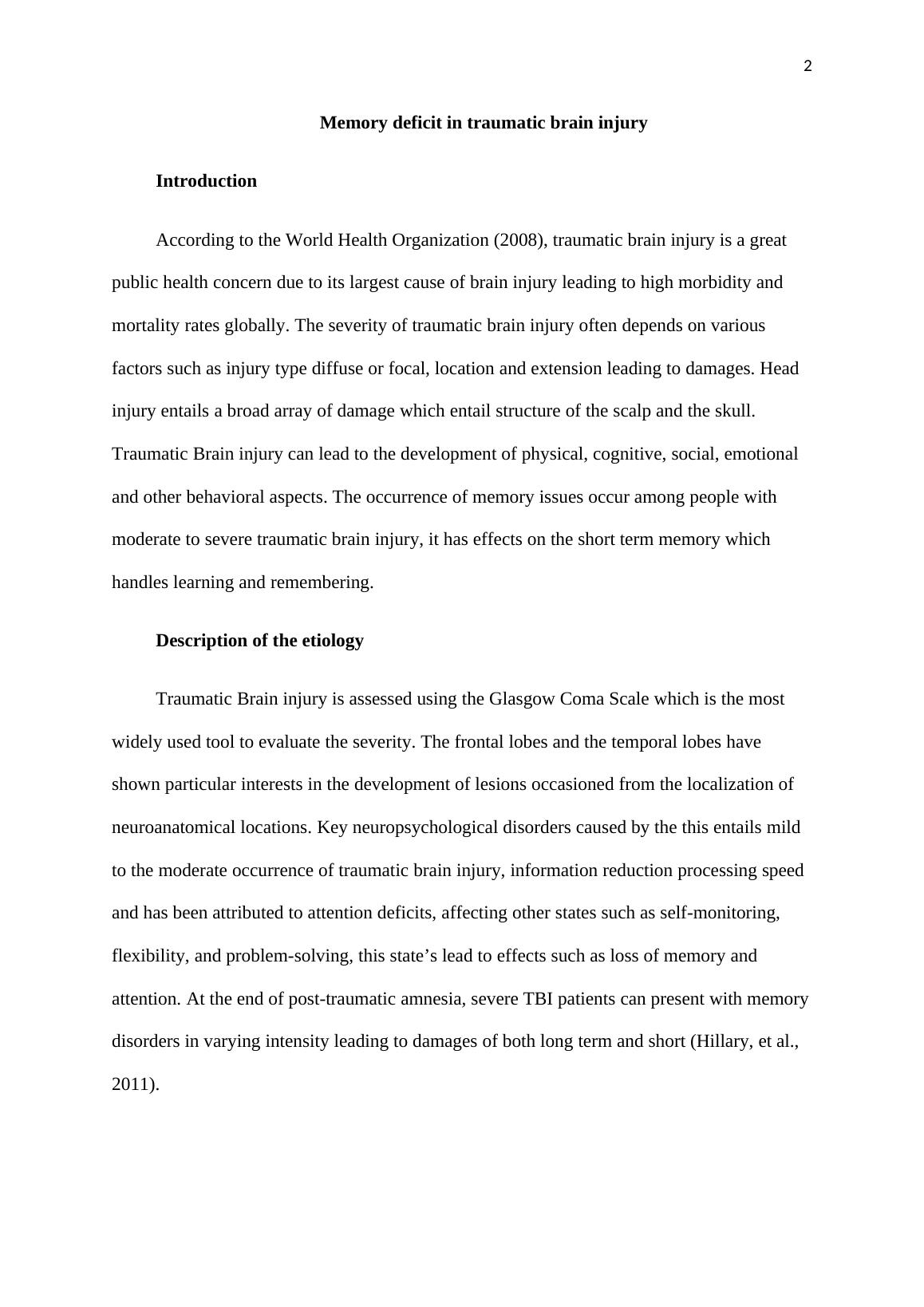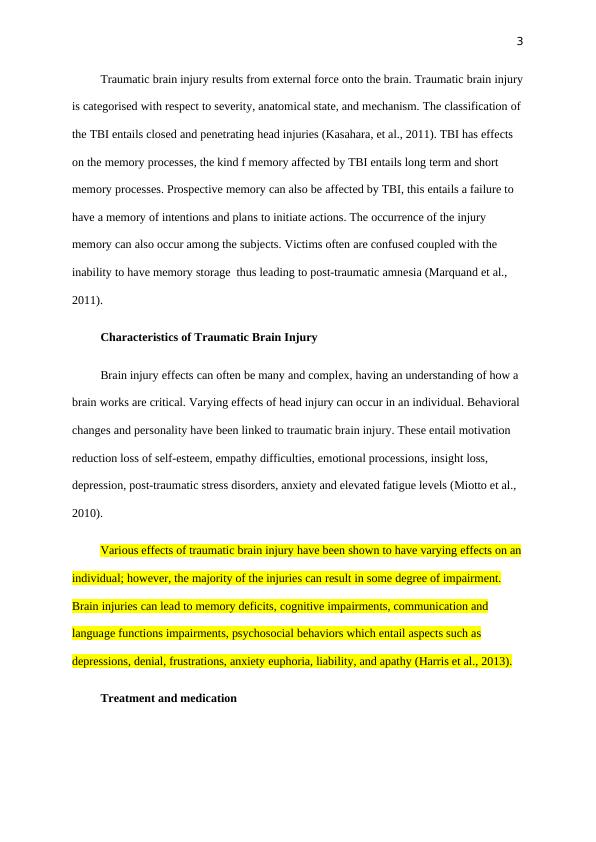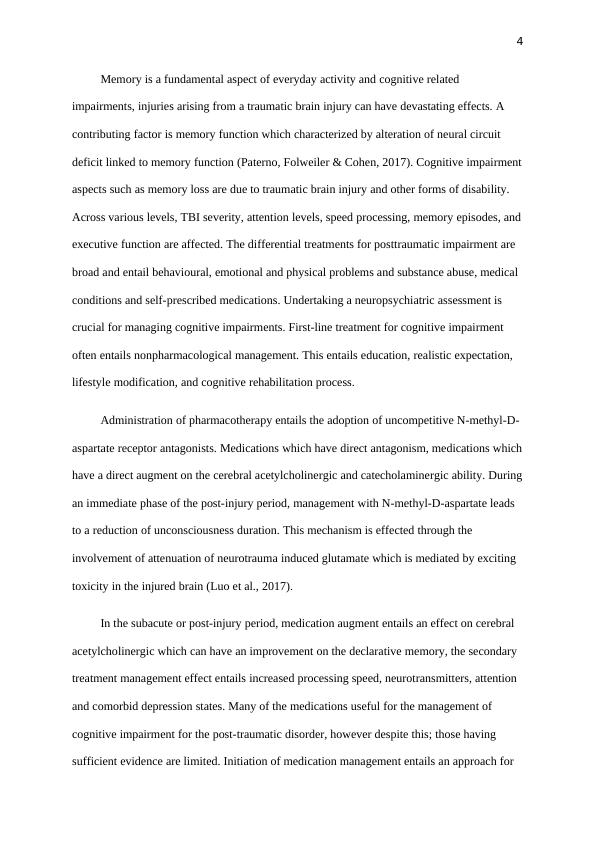Memory Deficit in Traumatic Brain Injury | Report
Added on 2022-08-25
11 Pages2735 Words15 Views
Memory deficit in traumatic brain injury
University
Task
Name
Unit
Date
University
Task
Name
Unit
Date

2
Memory deficit in traumatic brain injury
Introduction
According to the World Health Organization (2008), traumatic brain injury is a great
public health concern due to its largest cause of brain injury leading to high morbidity and
mortality rates globally. The severity of traumatic brain injury often depends on various
factors such as injury type diffuse or focal, location and extension leading to damages. Head
injury entails a broad array of damage which entail structure of the scalp and the skull.
Traumatic Brain injury can lead to the development of physical, cognitive, social, emotional
and other behavioral aspects. The occurrence of memory issues occur among people with
moderate to severe traumatic brain injury, it has effects on the short term memory which
handles learning and remembering.
Description of the etiology
Traumatic Brain injury is assessed using the Glasgow Coma Scale which is the most
widely used tool to evaluate the severity. The frontal lobes and the temporal lobes have
shown particular interests in the development of lesions occasioned from the localization of
neuroanatomical locations. Key neuropsychological disorders caused by the this entails mild
to the moderate occurrence of traumatic brain injury, information reduction processing speed
and has been attributed to attention deficits, affecting other states such as self-monitoring,
flexibility, and problem-solving, this state’s lead to effects such as loss of memory and
attention. At the end of post-traumatic amnesia, severe TBI patients can present with memory
disorders in varying intensity leading to damages of both long term and short (Hillary, et al.,
2011).
Memory deficit in traumatic brain injury
Introduction
According to the World Health Organization (2008), traumatic brain injury is a great
public health concern due to its largest cause of brain injury leading to high morbidity and
mortality rates globally. The severity of traumatic brain injury often depends on various
factors such as injury type diffuse or focal, location and extension leading to damages. Head
injury entails a broad array of damage which entail structure of the scalp and the skull.
Traumatic Brain injury can lead to the development of physical, cognitive, social, emotional
and other behavioral aspects. The occurrence of memory issues occur among people with
moderate to severe traumatic brain injury, it has effects on the short term memory which
handles learning and remembering.
Description of the etiology
Traumatic Brain injury is assessed using the Glasgow Coma Scale which is the most
widely used tool to evaluate the severity. The frontal lobes and the temporal lobes have
shown particular interests in the development of lesions occasioned from the localization of
neuroanatomical locations. Key neuropsychological disorders caused by the this entails mild
to the moderate occurrence of traumatic brain injury, information reduction processing speed
and has been attributed to attention deficits, affecting other states such as self-monitoring,
flexibility, and problem-solving, this state’s lead to effects such as loss of memory and
attention. At the end of post-traumatic amnesia, severe TBI patients can present with memory
disorders in varying intensity leading to damages of both long term and short (Hillary, et al.,
2011).

3
Traumatic brain injury results from external force onto the brain. Traumatic brain injury
is categorised with respect to severity, anatomical state, and mechanism. The classification of
the TBI entails closed and penetrating head injuries (Kasahara, et al., 2011). TBI has effects
on the memory processes, the kind f memory affected by TBI entails long term and short
memory processes. Prospective memory can also be affected by TBI, this entails a failure to
have a memory of intentions and plans to initiate actions. The occurrence of the injury
memory can also occur among the subjects. Victims often are confused coupled with the
inability to have memory storage thus leading to post-traumatic amnesia (Marquand et al.,
2011).
Characteristics of Traumatic Brain Injury
Brain injury effects can often be many and complex, having an understanding of how a
brain works are critical. Varying effects of head injury can occur in an individual. Behavioral
changes and personality have been linked to traumatic brain injury. These entail motivation
reduction loss of self-esteem, empathy difficulties, emotional processions, insight loss,
depression, post-traumatic stress disorders, anxiety and elevated fatigue levels (Miotto et al.,
2010).
Various effects of traumatic brain injury have been shown to have varying effects on an
individual; however, the majority of the injuries can result in some degree of impairment.
Brain injuries can lead to memory deficits, cognitive impairments, communication and
language functions impairments, psychosocial behaviors which entail aspects such as
depressions, denial, frustrations, anxiety euphoria, liability, and apathy (Harris et al., 2013).
Treatment and medication
Traumatic brain injury results from external force onto the brain. Traumatic brain injury
is categorised with respect to severity, anatomical state, and mechanism. The classification of
the TBI entails closed and penetrating head injuries (Kasahara, et al., 2011). TBI has effects
on the memory processes, the kind f memory affected by TBI entails long term and short
memory processes. Prospective memory can also be affected by TBI, this entails a failure to
have a memory of intentions and plans to initiate actions. The occurrence of the injury
memory can also occur among the subjects. Victims often are confused coupled with the
inability to have memory storage thus leading to post-traumatic amnesia (Marquand et al.,
2011).
Characteristics of Traumatic Brain Injury
Brain injury effects can often be many and complex, having an understanding of how a
brain works are critical. Varying effects of head injury can occur in an individual. Behavioral
changes and personality have been linked to traumatic brain injury. These entail motivation
reduction loss of self-esteem, empathy difficulties, emotional processions, insight loss,
depression, post-traumatic stress disorders, anxiety and elevated fatigue levels (Miotto et al.,
2010).
Various effects of traumatic brain injury have been shown to have varying effects on an
individual; however, the majority of the injuries can result in some degree of impairment.
Brain injuries can lead to memory deficits, cognitive impairments, communication and
language functions impairments, psychosocial behaviors which entail aspects such as
depressions, denial, frustrations, anxiety euphoria, liability, and apathy (Harris et al., 2013).
Treatment and medication

4
Memory is a fundamental aspect of everyday activity and cognitive related
impairments, injuries arising from a traumatic brain injury can have devastating effects. A
contributing factor is memory function which characterized by alteration of neural circuit
deficit linked to memory function (Paterno, Folweiler & Cohen, 2017). Cognitive impairment
aspects such as memory loss are due to traumatic brain injury and other forms of disability.
Across various levels, TBI severity, attention levels, speed processing, memory episodes, and
executive function are affected. The differential treatments for posttraumatic impairment are
broad and entail behavioural, emotional and physical problems and substance abuse, medical
conditions and self-prescribed medications. Undertaking a neuropsychiatric assessment is
crucial for managing cognitive impairments. First-line treatment for cognitive impairment
often entails nonpharmacological management. This entails education, realistic expectation,
lifestyle modification, and cognitive rehabilitation process.
Administration of pharmacotherapy entails the adoption of uncompetitive N-methyl-D-
aspartate receptor antagonists. Medications which have direct antagonism, medications which
have a direct augment on the cerebral acetylcholinergic and catecholaminergic ability. During
an immediate phase of the post-injury period, management with N-methyl-D-aspartate leads
to a reduction of unconsciousness duration. This mechanism is effected through the
involvement of attenuation of neurotrauma induced glutamate which is mediated by exciting
toxicity in the injured brain (Luo et al., 2017).
In the subacute or post-injury period, medication augment entails an effect on cerebral
acetylcholinergic which can have an improvement on the declarative memory, the secondary
treatment management effect entails increased processing speed, neurotransmitters, attention
and comorbid depression states. Many of the medications useful for the management of
cognitive impairment for the post-traumatic disorder, however despite this; those having
sufficient evidence are limited. Initiation of medication management entails an approach for
Memory is a fundamental aspect of everyday activity and cognitive related
impairments, injuries arising from a traumatic brain injury can have devastating effects. A
contributing factor is memory function which characterized by alteration of neural circuit
deficit linked to memory function (Paterno, Folweiler & Cohen, 2017). Cognitive impairment
aspects such as memory loss are due to traumatic brain injury and other forms of disability.
Across various levels, TBI severity, attention levels, speed processing, memory episodes, and
executive function are affected. The differential treatments for posttraumatic impairment are
broad and entail behavioural, emotional and physical problems and substance abuse, medical
conditions and self-prescribed medications. Undertaking a neuropsychiatric assessment is
crucial for managing cognitive impairments. First-line treatment for cognitive impairment
often entails nonpharmacological management. This entails education, realistic expectation,
lifestyle modification, and cognitive rehabilitation process.
Administration of pharmacotherapy entails the adoption of uncompetitive N-methyl-D-
aspartate receptor antagonists. Medications which have direct antagonism, medications which
have a direct augment on the cerebral acetylcholinergic and catecholaminergic ability. During
an immediate phase of the post-injury period, management with N-methyl-D-aspartate leads
to a reduction of unconsciousness duration. This mechanism is effected through the
involvement of attenuation of neurotrauma induced glutamate which is mediated by exciting
toxicity in the injured brain (Luo et al., 2017).
In the subacute or post-injury period, medication augment entails an effect on cerebral
acetylcholinergic which can have an improvement on the declarative memory, the secondary
treatment management effect entails increased processing speed, neurotransmitters, attention
and comorbid depression states. Many of the medications useful for the management of
cognitive impairment for the post-traumatic disorder, however despite this; those having
sufficient evidence are limited. Initiation of medication management entails an approach for

End of preview
Want to access all the pages? Upload your documents or become a member.
Related Documents
Critical Thinking in Treatment of Traumatic Brain Injurylg...
|12
|3330
|72
Contribution of Human Amnesia Case Studies to Understanding Brain Mechanisms of Memorylg...
|8
|2267
|312
Medical Journal of Islamic Worldlg...
|11
|3065
|19
How Brain Injury Affects Human Behavior: A Studylg...
|4
|719
|313
Methods of Gathering Further Informationlg...
|13
|3825
|396
Pathophysiology of Concussive Injuries and Treatmentlg...
|5
|782
|65
